|
|
|
 |
 |
|
|
.
Book Covers (Part 2)
.
|
| |
 Welcome to the
Art of Desmond Cory - a history of his novels as portrayed
through the book covers Welcome to the
Art of Desmond Cory - a history of his novels as portrayed
through the book covers
The 1970s continued Desmond Cory's
focus away from the espionage novel (as characterised
through his fictional hero Johnny Fedora) to the pschological
thriller. In an interview, Cory admitted that " I
donít know that I ever got tired of him (Fedora), but
round about 1970 I came to the conclusion that the kind
of story he had to get involved in was being James-Bonded
out of existence and that the general public were getting
a surfeit of it". Cory consequentially experimented
with a number of different novels, including Nighthawk,
which went on to win the Crime Critics Choice of the Year
award.
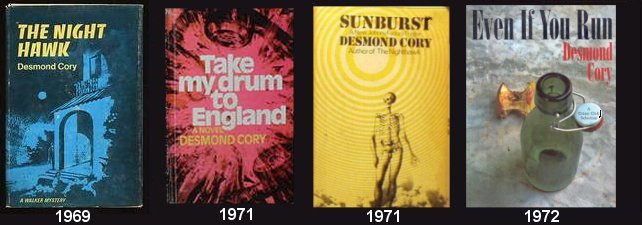
Much to the regret of many of his
readers, Cory also completed Johnny Fedora's last assignment
in 1971 with the publication of Sunburst. Like many covers
of its day, the design for it's first hard-back edition
(Hodder & Stoughton, London) was rather surreal.
 |
Throughout
the 1970s, Cory continued to experiment with his
novels, dabbling into many different genres. A humorous
detective story featuring an inane wizard (in Stumblebum
the Wizard), a parodic version of Hamlet (in Lucky
Ham), all displayed Cory's rich and skillful writing
abilities. Yet his
greatest success during this period came in 1975
with The Circe Complex.
With cover art from Wendell Minor (USA edition),
the novel went on to win the Sunday Times Crime
Novel of the Year.
Following Thames Television's decision to televise
the book as a 6 part "Armchair Thriller"
series, the novel was later republished in 1980
using images from the TV series for its cover. |
| In
the late 70s, the author turned to writing academic
books rather than fictional novels. In 1977 he gained
a Doctorate in English Literature, and (using his
real name) wrote a number of articles and books
on a variety of works ranging from a study of Virginia
Woolf to Robert Firbank. That same year, Bennet
was published. It was to be his last novel for the
next 12 years. |
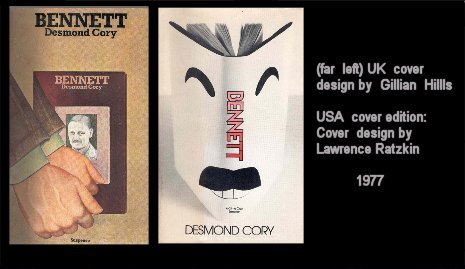
|
The 1980s was very much a dry period
as far as the publication of Desmond Cory's fictional
novels was concerned. Instead, the author continued with
a number of different academic publications, and his desire
to experiment with new types of fiction never diminished.
He completed a number of unpublished novels (The Caligula
Conspiracy, and On The Gulf) that just did not interest
the publishers. The Song of Fariq, a short story in The
Mystery Guild Anthology, was one of the few fictional
works to be published at this time.. Meanwhile, American
publishers (Walker) continued to republish several of
his earlier novels.
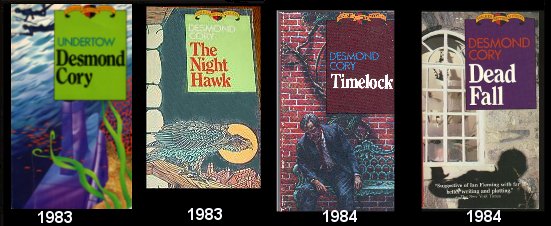
It was not to be until the early
1990s that new fictional novels from Cory were published
again. Described by the critics as the "near-perfect puzzler,
written with intelligence and laced with wit." (Publishers
Weekly 1992), Cory introduced us to the "offbeat,
funny, and ingenious" new serial character, Prof.
John Dobie, an absent-minded Maths professor with a tendency
to find murder far too occasionally.
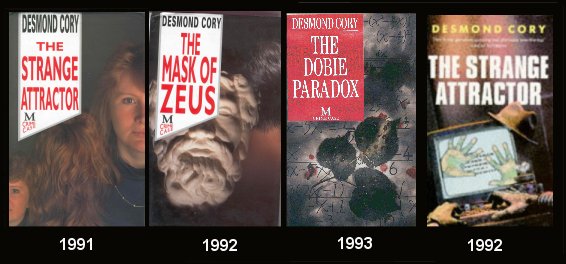
Cory was to have 3 books published
under this new serial character. While Cory's UK publishers
(Macmillan) used photograpic cover designs for the hardback
versions, the publishers PAN used more artisitic and interesting
designs for the paperpack version of Dobie's first novel
The Strange Attractor.Cory's
US publishers (St. Martin's Press) also went for more
beautifully illustrated designs, this time by Paul Cozzolino.
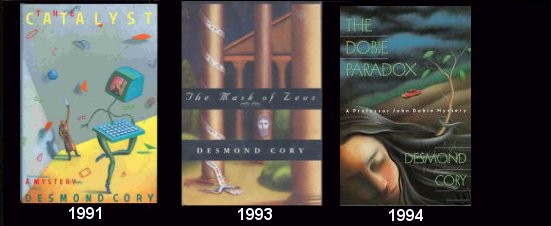
The Dobie Paradox (1994) was to
be Cory's last published novel while he was alive. In
his last years Cory 's fading eye-sight and general health
limited him, althought the author went on to complete
a number of hand-written manuscripts which to this day
await publication Interest in his novels have continued
to this day, and in 2011 his books were published again,
both in print and through new media such as audiobooks
and ebooks. |
| |
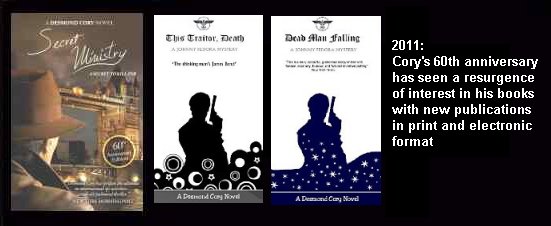
Ana Grigoriu designed the 60th anniversary edition
of Secret Ministry, published first in 2011. Since
then Ostara have republished Overload, and Fedora
novels have been published on Amazon Kindle.
|
|
| |
For more information, take the Virtual
Tour of Desmond Cory in books, film and television:
|
| |
|
|
| |
|
| |